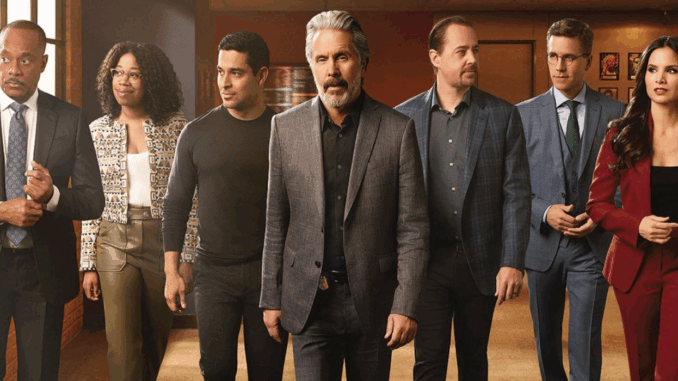
The debut season of NCIS: Tony & Ziva has been nothing short of a fan service masterpiece, expertly blended with a high-octane international thriller. For years, the NCIS faithful—known affectionately as the TIVA shippers—awaited a definitive, satisfying resolution to the decades-long “will-they-won’t-they” saga of Tony DiNozzo (Michael Weatherly) and Ziva David (Cote de Pablo).
Showrunner and executive producer John McNamara (known for The Magicians and Aquarius) didn’t just meet expectations; he understood the assignment implicitly. In an interview previewing the season finale, McNamara opened up about the careful balance of crafting a compelling, mature spy story while delivering the crucial closure and romantic payoff that the devoted fan base required.
His core philosophy? Make a show for the fans, but make it psychologically honest.
The Romantic Payoff: A Journey to Destiny
McNamara, a longtime friend of Michael Weatherly and a fan of the original NCIS dynamic, viewed the spin-off as, at its heart, a love story. But he recognized that a happy couple doesn’t make for interesting drama—at least not initially.
“I just thought, okay, it’s a love story. And love stories don’t really work if the couple is happy,” McNamara explained. “They work better when they’re not together, kind of not happy. And it’s the story, it’s the plot, it’s the danger and the suspense to bring them together, you know. So, I want to make that a kind of journey.”
This explains the strategic decision to start the series with Tony and Ziva raising their daughter, Tali, but not being romantically partnered. Their relationship was a “polite lie” in 2025, according to McNamara, a state of arrested development that the plot—being made international fugitives—was designed to “rip the band-aid” off.
The entire season was a careful, calculated escalation of their relationship:
- Undercover Spark: An early episode saw them forced to pose as a married couple, an opportunity that delivered the classic banter and undeniable chemistry fans craved. McNamara made sure to give fans moments, noting, “Let’s give them the first time they slept together in episode three.”
- The Love Declaration: By Episode 9, the plot had forced them to confront their feelings, leading to the actual love declaration that felt like a payoff decades in the making.
The finale, therefore, promises to be the destination of that journey, fulfilling the “sense of destiny” that the showrunner felt was crucial to their story.
Answering the Burning Questions: Why They Weren’t Married
One of the biggest mysteries the spin-off addressed was the five-year gap between Ziva’s return to the U.S. and the start of the series—specifically, why Tony and Ziva never got married after their tearful reunion in Paris.
McNamara made it a key priority to answer this question honestly, not just with plot mechanics, but with deep character exploration. Episode 9 reportedly provides the explanation for “why the wedding fell apart.”
Ziva’s Unresolved Trauma
Crucially, McNamara revealed that Ziva’s storyline was approached with psychological realism. A discussion with Cote de Pablo led to the mutual agreement that Ziva, despite reuniting with her family, was “broken, really broken” by her years on the run and the trauma she endured.
“I go, good, good. Let’s do that,” McNamara recalled. This commitment to Ziva’s ongoing PTSD gave the story “so much juice,” as it prevented the couple from seamlessly slipping into a conventional happily-ever-after. The trauma was an “ongoing issue” for Ziva, and also served to “reveal some of Tony’s more latent trauma” related to her absence and his grief.
The finale closure isn’t just about neutralizing the threat; it’s about Tony and Ziva finally resolving the psychological barriers that prevented them from fully committing to one another, making the eventual romantic resolution feel earned and mature.
Tony’s Denial and Growth
Tony’s character arc was also essential. McNamara designed Tony’s professional life—running a high-tech security company—and his personal life—a failed romantic relationship—to show that he was “sleepwalking through his life a little bit” and “in denial about how much he was still in love with Ziva.” The high-stakes nature of the caper was the necessary shock to force Tony to confront his true feelings and to realize that Ziva was his destiny.
Balancing Action, Comedy, and Psychological Honesty
The decision to move away from the procedural format of the flagship show and create a 10-hour, serialized espionage story set in Europe was a major creative risk, but one that McNamara felt was necessary to make the series distinct and allow for deeper character work.
The tone, as described by Tony in the show, is a “fine line between a techno thriller and a workplace comedy.” McNamara successfully retained the “very, very funny” banter and interplay that defined the TIVA dynamic on NCIS, while using the streaming format to “go a little bit deeper” into their emotional landscape.
The finale is expected to deliver the action and suspense that the European setting promised, tying up the plot thread of the international conspiracy and addressing the shocking death of a major character that raised the stakes earlier in the season. McNamara affirmed that Tony’s grief over the loss of his friend would not be “lightly brush[ed] off,” ensuring the finale carries emotional weight alongside its action beats.
Ultimately, John McNamara’s approach to the NCIS: Tony & Ziva finale is a testament to the power of fan-driven content guided by genuine creative instinct. The finale is set to give fans the romantic closure they’ve waited for, not through an easy wedding, but through a hard-won, psychologically grounded realization of their profound love for each other and their shared commitment to Tali. It’s a finale designed to honor the legacy of TIVA and propel the characters into a thrilling, albeit unconventional, future.
